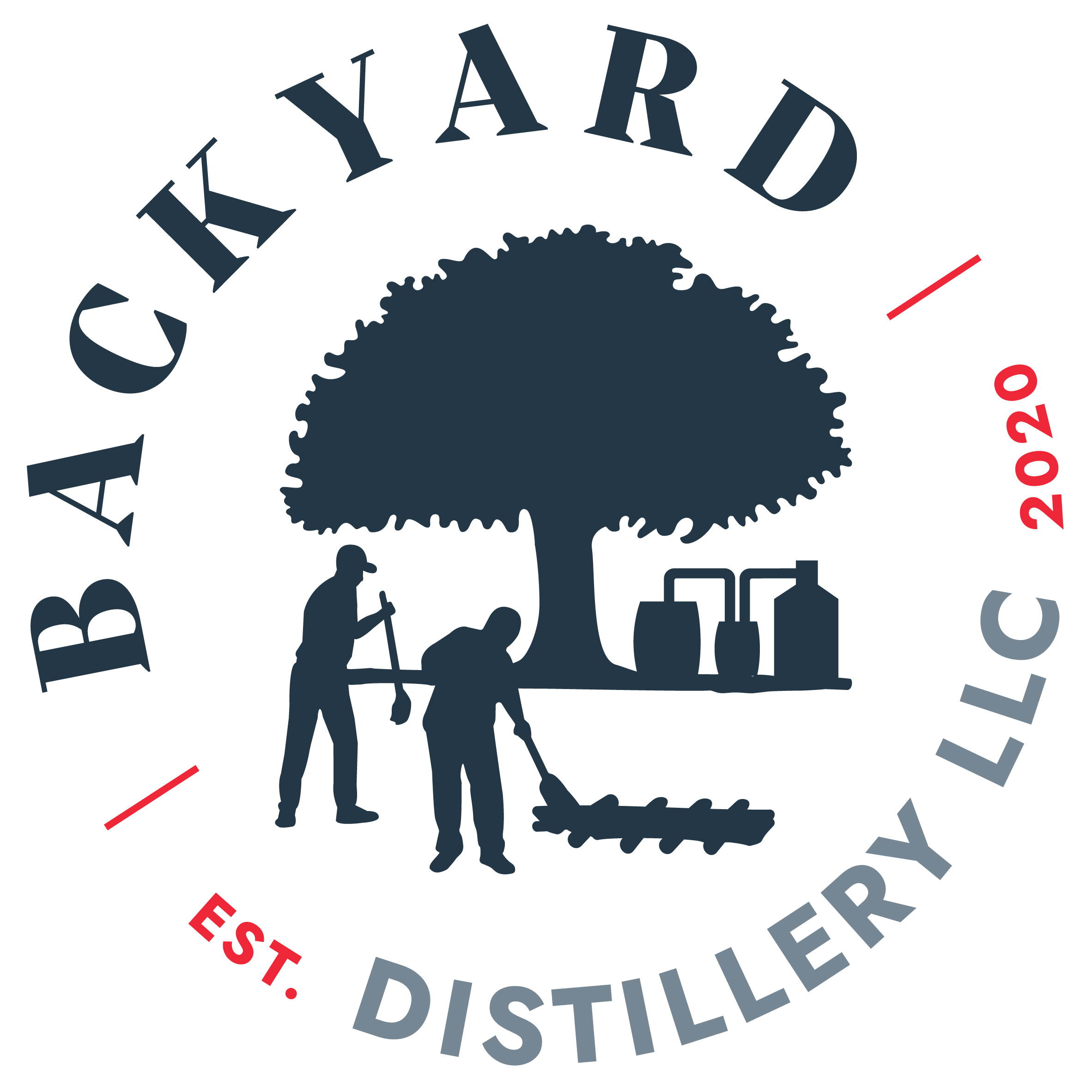What is Moonshine in the store vs. Backyard Distillery’s Moonshine?
“Moonshine” or Shine for short is a phrase that was understood to be “illegal” or “non tax-paid” Liquor, or deep in the culture stump, stumphole, or bootleg to name a few. TTB, formerly Alcohol, Tobacco, and Firearms (ATF) also our federal regulator, does not recognize Moonshine as a legally defined spirit type like Whiskey, Bourbon, Gin, and Vodka as an example. So legal distillers are free to label anything “Moonshine” and that is where the problem resides.
Culturally, moonshine is regionally all over the globe. In the American South(United States), moonshine comes in two varieties. Corn Liquor, where the corn is malted, cracked and cooked is one type before fermenting. The sugar source in this type is the carbohydrates in the corn itself. Typically, farmers who had corn left over a growing season would use that leftover corn to make shine to supplement their family’s income. The second variety, which is more prevalent in Shine made strictly for retail is “Sugar-based shine”, which is what we make as noted on our label as cane and grain. Our exact mash bill for the spirit nerds, we are not disclosing. Our mash have some part corn, but in some special releases there are other things that maybe added such as sweet potatoes or others specialty grains, but the alcohol comes from the cane sugar. From a point of science, metabolically speaking, the conversion process from cane sugar to alcohol should be cleaner than cooking corn, using a malt that contains amylase to convert the carbohydrate to simple fermentable sugar, before being converted to alcohol which is more complex than going directly from a simple sugar. With the complicated conversions, a clean fermentation may be disrupted by bad bacteria or ester formations.
We have heard that a lot of “legal moonshine” sold in the store is not fit to drink, or it just doesn’t taste as good what is purchase illegally. Well, we say that is true based upon what it is from our analysis and research.
A lot of time that is an accurate statement, except when an illegal liquor still in the woods is poorly constructed and bad spirit manufacturing processes are used. So this is why they some moonshine will kill you or be rot gut. For example, an illegal liquor still made with lead components, car radiator, or 55 gallon drums as an example, the quality just is not going to be there in comparison to a liquor still made with copper or stainless still. Until recently, all legal products labeled “moonshine” were produced by large distilleries, and the emphasis is on PROFIT not QUALITY. As such, a “Moonshine” label can be placed on a bottle of anything, and these large distillers have been pumping out a cheap vodka continuously using a column still and call it “Moonshine” to sell anything to make a buck. Smaller distillers in the woods or now ones like us at Backyard Distillery that are legal, are willing to take the time and bear the expense to produce a quality moonshine(aka shine) in batches in a pot still. The large corporations can’t afford to bear the expense and will not bear the expense to make quality spirts. To make a plan analogy, a pasture raised hog vs commodity hog are very different in quality and ultimately taste. The smaller craft distilleries are able to do things that large corporation won’t or can’t because of the large overhead and infrastructure it takes to be a behemoth in the marketplace.
PSA, any time you do decide to buy any moonshine in a retail store, PLEASE READ THE LABEL. The first clue that tells you are getting an everclear like product, are the terms “Grain Neutral Spirit” or “Neutral Grain Spirit.” These labels are commonly found in Vodkas. Grain Neutral or Neutral Grain require that the distillation point be at or above 190 proof and it is most efficiently done using a column still. Spirits distilled to 190 proof have no flavor carryover from the mash and are tasteless. Real small batched moonshines, particularly in a pot still like ours have a distinct flavor from their mashes, whether corn whiskey or a sugar shine. You get some of the oils (or mouth feels) from those pot stills that a column can give you. Don’t be tricked into paying good money for cheap vodka called moonshine, read the label or better yet buy from Backyard Distillery.
Most folks around Backyard Distillery and generally in the rural south used to know what good Moonshine is supposed to taste like, where as most folks around the country don’t. It is why we will be educating you during our marketing so you become a more informed consumer. At a minimum we will put the information out for consumption with the spirit. The larger companies have no desire to make quality because the average buyer doesn’t know the difference and sometimes may believe because they are paying more money they are getting a higher quality product. At Backyard Distillery, we believe that a top notch moonshine should be superior in quality and drinkability to anything that you can purchase from a mass distiller/bottler and the price does not have to break the bank. One final thing, do realize, every legal distillery or brand name is not manufacturing their own spirits, because they are purchasing from other distilleries and blending and bottling it as their own, to create a spirits brand. Backyard Distillery is a manufacturer, where we go from farm to glass or farm to small milk jug in our case for our initial product offering.
SC Moonshine Distillery Rises Out of the Covid Pandemic
For Immediate Release. Backyard Distillery LLC is opening up its South Carolina’s Distillery on our family farm with moonshine. Not only are we distilling an old legacy Sandhills moonshine recipe that has its flavor inspired by “shines” that were found in the immediate communities on the edge of Clarendon (Rimini, Panola, Paxville) and Sumter (Pinewood) counties, but with improved manufacturing processes we are also preserving an often untold, unheard history and art. Moonshine is as much a part of the Southern experience to black people as white people. Backyard Distillery was founded to represent the best of South Carolina culture, traditions, and bottle this unique history using both art and science.
For Christmas 2022, Backyard Distillery will open for limited hours for carry-out only and there will be no onsite tastings/tours. We will only be selling two expressions of moonshine, our traditional (white) and barrel finished (brown) in 900 ml (30.4 oz) bottles at 90 Proof. We will be open between December 19-December 30, 2022, hours to be announced later. We are working out processes for pre-orders and pickup, but because of state law we are not able to ship. Each adult can pickup six (6) bottles per day at purchase per state law. Each jug will be available for $20.00 (tax included)
Backyard Distillery has been in the works since 2015 and then restarted in2019 just before the world stopped when the Covid Pandemic hit. While the world paused, businesses closed. However the vision and tenacity of Backyard Distillery’s LLC founders in South Carolina became focused. We recognized the value of alcohol is more than just an beverage, it could be used as a locally-produced hand sanitizer, which my community lacked both this spirit and capability to make products where alcohol is an ingredient. The founders dug deep, held on to a dream deferred and brought their distillery into existence in 2020; from a few design sketches on paper to a fully operational and legal distillery to hone our craft.
Without the community support and sacrifice of Backyard Distillery’s founders, we would not be here today. We are probably one of South Carolina’s smaller distilleries in state, as our focus has been on making a high-quality product. During this soft opening, we will be improving systems and seeing how we engage best with the public. Thus, we want to learn from sales this Christmas 2022, to come back in the Spring 2023, even better. Stock up your bar while supplies last! #Farm2Shine Responsibly.
Follow us on Facebook and IG at @BackyardDistilleryLLC. We are also on the web at www.backyarddistilleryllc.com. For distillery related questions, please contact info@backyarddistilleryllc.com. For all media and press, please contact info@conyersfamilybbq.com.
####
Drink (aka Liquor, Nip, or Shot) House
In years past, residential homes used to sell illegal liquor in what some would call a drink house, liquor house, shot house, or nip house. These houses, known by various names were a widespread phenomenon in southern black communities, in rural settings. These houses created a sense of community for people of various income levels, as it was an outlet. The alcohol was cheaper in price, but the quality was not inferior to taxed liquor, depending on the moonshiner experience making the alcohol as this could have been a multigenerational businesses for certain moonshiners. Depending on the house and its management, gambling, food, and music was part of the experience. Food had to be a part of the experience, because you have to feed the alcohol. The more alcohol you drink the more food one would consume, so when more black people were farmers or landowners, having a bbq or fish fry at these businesses, were a necessity but more feasible to do than say fried chicken before commodity farm operations. The foods eventually became more diverse in its offering as times past. The liquor house while sharing a lot of commonalities with the sale of illicit liquor, it is different from a juke joint, as the latter operates as an illegal bar that is open to the public in a non residential dwelling. Also, the liquor house is generally distinct from the bootleggers operations, a bootlegger sells alcohol in bulk to consume off premises, so not to have to deal with the behavior when people drink irresponsibly of those in a liquor house. Sometimes in the past, the bootlegger was the moonshiner that made the liquor in the woods and the spouse ran the liquor house too. There is not one way these illegal liquor houses and bootleggers operated, because they were tailored to create a livelihood and sustained a community that helped black people to survived in the rural south as well as the cities in both the north and south.
Before drugs came on the scene, illicit alcohol would feed the underground economy that some may have seen in rent parties or speakeasies in rural and urban places alike. The underlying concepts eventually merge themselves in what people may know today as trap houses, swisha houses, etc but alcohol is not the main thing for sale in the latter. In a space where one economic situation caused by systematic policies, the underground economy was one place to survived for the poor and the rich to thrive. Let’s not forget that white preachers, politicians, and law enforcement had their hands in this underground economies, past, present, and future depending on the size of the operation, so while taxes did not go to the federal government, a tax in the form of bribe was paid locally. For far too long, the access to create legitimate business for black Americans were not allowed and it was not because people did not have the aptitude, but it was just sheer racism that often would not allow one to get the piece of paper to operate legally. As opportunities are now available to obtain pieces of paper to operate a business is more readily available, the next road hurdle to overcome is the access to capital to start operate and keep a business going.
Backyard Distillery is paying homage to the liquor house and bootlegging cultures where so many Americans in the south labored over the stills, despite what is accurately portrayed in media, marketing schemes, tourism brochures, etc.
History of the name stump, stumphole, bootleg, corn versus the label Moonshine (Shine)
This tradition was maintained in the woods of the American south but you had places in the city that made liquor illegally too. It was more conducive to make spirits in the rural areas and then transport to cities, when it was illegal. As we the founders are from the south, our perspective will be from that reference. The name stump and stump hole refers to a hiding place of the finish product for the consumer to pickup, as it could be an old stump, or a hole in the ground, that a jar is placed for a customer to come pick up but to the lay person, it would simply look like a fresh dug hole. Bootleg, is shortened from the word bootlegger, and bootleg was the product the bootlegger made or sold. In our areas, the bootlegger was primarily the distiller but no one knew who the individual was until they were busted and you did not talk about who was the distiller even if you knew. Corn was the shortened name for corn liquor, but it did not always have the same mash bill as what the government required for today. Corn was just one of the grains used in fermenting with sugar. Without sugar or the conversion of a carbohydrate to a sugar, one can’t make alcohol. Shine was a shortened name for Moonshine and it was used more frequently than. Moonshine, comes from manufacturing of the product at night time in the woods when it was illegal, and taxes were not being paid. The last term, in how Shine was referred was unsealed liquor meaning excise taxes were not paid to the authorities.
Moonshine is a forgotten spirit
Moonshine, is a forgotten spirit to most and it was so much more than what people see on the TV shows.
However, it was more referred by the name as Stump, Stumphole, Corn, or simply Shine, as we will explain more around the culture, and history on our blog, podcast, and maybe a book in the future. Moonshine had a much deeper and richer story in the American landscape, where farmers, politicians, preachers, law enforcement and the distiller had a special relationship when laws made it illegal. We know about Prohibition, but there were other scenarios when making liquor was illegal and still illegal. The laws have an impact on the illicit distilling in wet and dry counties. This liquor should be held in much higher esteem, as it was locally made from the manufacturing of equipment, the ingredients provided by local farmers, the water, and to how it eventually got to consumer.
In communities across the south, this spirit was key to survival in both the country and city.
Times were hard, and so the equipment of manufacture was not always what it could be because why make an investment in something that may get destroyed if busted. Some folks took more pride in their setups and others did not because they did not have, or simply they use what they had access like old radiators as an example, which were poisonous. The levels of makers, varied but some of the makers were masters and others gave the culture a bad rap. Considering the work environment, some of the better shiners had to be masters, to work through various things like low light, swampy terrain, rain, possible visitation from wild animals, and building wood fires after trudging to their still site. The ability to operate and execute a high level of cleanliness to generate any decent product, one could only do so much one can in the woods. We are celebrating this moonshine, as this spirit had far reaching impacts, to educating young people, providing an opportunity for a community to survive, helping to maintain land ownership, and simply putting food on the table.
Now that Shine can be made legally, we are doing it, building off an overlooked history to go into the future with the best processes that we can implement with old recipes.
Why is Moonshine being offered first at Backyard?
Most distilleries started with offering Gin or Vodka, as the unaged spirit. We chose to start with moonshine, as it was the spirit most rooted in our community, even though it was illegal. What was most prevalent in our community was a grain and sugar based spirit, not the “white dog” spirit that is often the unaged that go into the barrels to make whiskey. Now the laws, have changed to allow microdistilleries, we felt this was the time to do something to create a legal business that allows us to create and build on a product and culture we know. If we don’t value our culture, someone else will see value in it and sale it, so we are honoring our heritage in this industry. We will eventually add whiskey, bourbon, rum and brandy to our spirit selection, as if the ingredients to mash can be grown and fermented, we will distill it.



